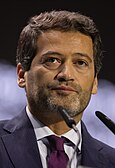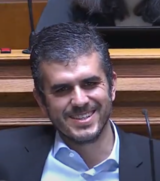
Back Eleccions legislatives portugueses de 2019 Catalan Parlamentswahl in Portugal 2019 German Πορτογαλικές βουλευτικές εκλογές 2019 Greek Elecciones parlamentarias de Portugal de 2019 Spanish Portugalin parlamenttivaalit 2019 Finnish Élections législatives portugaises de 2019 French Elezioni legislative in Portogallo del 2019 Italian Portugese parlementsverkiezingen 2019 Dutch Parlamentsvalget i Portugal 2019 NB Eleições legislativas portuguesas de 2019 Portuguese
| |||||||||||||||||||||||||||||||||||||||||||||||||||||||||||||||||||||||||||||||||||||||||||||||||||||||||||||||||||||||||||||||||||||||||||||||||||||||||||||
230 seats in the Assembly of the Republic 116 seats needed for a majority | |||||||||||||||||||||||||||||||||||||||||||||||||||||||||||||||||||||||||||||||||||||||||||||||||||||||||||||||||||||||||||||||||||||||||||||||||||||||||||||
|---|---|---|---|---|---|---|---|---|---|---|---|---|---|---|---|---|---|---|---|---|---|---|---|---|---|---|---|---|---|---|---|---|---|---|---|---|---|---|---|---|---|---|---|---|---|---|---|---|---|---|---|---|---|---|---|---|---|---|---|---|---|---|---|---|---|---|---|---|---|---|---|---|---|---|---|---|---|---|---|---|---|---|---|---|---|---|---|---|---|---|---|---|---|---|---|---|---|---|---|---|---|---|---|---|---|---|---|---|---|---|---|---|---|---|---|---|---|---|---|---|---|---|---|---|---|---|---|---|---|---|---|---|---|---|---|---|---|---|---|---|---|---|---|---|---|---|---|---|---|---|---|---|---|---|---|---|---|
| Opinion polls | |||||||||||||||||||||||||||||||||||||||||||||||||||||||||||||||||||||||||||||||||||||||||||||||||||||||||||||||||||||||||||||||||||||||||||||||||||||||||||||
| Registered | 10,777,258 | ||||||||||||||||||||||||||||||||||||||||||||||||||||||||||||||||||||||||||||||||||||||||||||||||||||||||||||||||||||||||||||||||||||||||||||||||||||||||||||
| Turnout | 5,237,484 (48.6%) | ||||||||||||||||||||||||||||||||||||||||||||||||||||||||||||||||||||||||||||||||||||||||||||||||||||||||||||||||||||||||||||||||||||||||||||||||||||||||||||
| |||||||||||||||||||||||||||||||||||||||||||||||||||||||||||||||||||||||||||||||||||||||||||||||||||||||||||||||||||||||||||||||||||||||||||||||||||||||||||||
| |||||||||||||||||||||||||||||||||||||||||||||||||||||||||||||||||||||||||||||||||||||||||||||||||||||||||||||||||||||||||||||||||||||||||||||||||||||||||||||
The 2019 Portuguese legislative election was held on 6 October 2019.[2] All 230 seats to the Assembly of the Republic were contested.
In a campaign dominated by the Tancos airbase robbery[3] (in which former Defense Minister Azeredo Lopes (2015–2018) was accused of trying to cover-up the finding of the stolen weapons in the robbery), but also with the good economic situation in Portugal, the Socialist Party (PS) won the elections with 36 percent of the votes and 108 seats, a gain of 22 compared with 2015. The PS won the big districts of Porto and Lisbon, although Porto was closer than expected, and was able to gain districts from the PSD, like Aveiro and Viana do Castelo, by razor thin margins.[4] The PS won the city of Lisbon, however with a smaller share of the vote compared with 2015, 33 vs 35 percent, and, surprisingly lost the city of Porto to the PSD.
The Social Democratic Party (PSD) obtained 28 percent of the votes and won 79 seats. The party lost 10 seats compared with 2015, and, in terms of share of vote, it was the worst result since 1983, however in terms of seats, it was only the worst result since 2005, when the party won 75 seats. The PSD was able to hold on to their bastions of Viseu, Vila Real, Bragança, Leiria and Madeira. On election night, PSD leader Rui Rio classified the results as "not a disaster" and left the door open to continue as party leader.[5] However, in the aftermath of the election, several members of the party announced their intention to challenge Rio's leadership.[6]
The Left Bloc (BE) achieved a similar result to 2015. The party won almost 10 percent of the votes and held the 19 seats elected in 2015. On election night, Catarina Martins said she was open to new negotiations with PS. The Unitary Democratic Coalition, (CDU), PCP-PEV coalition, suffered heavy losses, with 6.3 percent of the votes and 12 seats, and Jerónimo de Sousa, PCP secretary-general, said on election night that written agreements with PS were off the table. CDS – People's Party got just 4.2 percent of the votes, and got a parliamentary caucus reduced to just 5 seats, the lowest since 1991 and when the party was called the "taxi party", down from 18 in the 2015 election. Assunção Cristas, CDS leader, resigned on election night, called for a snap party congress and announced she would not run for reelection.[7] People-Animals-Nature (PAN) saw a big increase in its share of the vote, winning 3.3% and 4 seats from Lisbon, Porto and Setúbal.
This election was marked by the entry of three new parties in Parliament. The right-wing/far-right party CHEGA (CH) was one of the big surprises on election night by electing an MP from Lisbon. It was the first time since the return to democracy that a right-wing/far-right party gained representation in Parliament.[8][9] LIVRE and Liberal Initiative also elected one MP for Lisbon. Former Prime Minister and PSD leader Pedro Santana Lopes' new party, Alliance, failed to win a single seat and polled below 1 percent of the votes.
The turnout in this election was the lowest ever in a general election in Portugal, with just 48.6 percent of registered voters casting a ballot. In Portugal alone, 54.5 percent of voters cast a ballot, a drop compared with the 57 percent in the 2015 election.
- ^ "Mapa Oficial n.º 8/2019", Comissão Nacional de Eleições, 12 August 2019. Retrieved 31 August 2019.
- ^ "Marcelo anuncia eleições legislativas em 6 de outubro", Sapo 24, 7 December 2018. Retrieved 7 December 2018.
- ^ "Há um antes e um depois da acusação de Tancos na campanha ", Público, 26 September 2019. Retrieved 5 April 2020.
- ^ "Um mapa cor-de-rosa com sete maiorias absolutas", Público, 7 October 2019. Retrieved 9 October 2019.
- ^ "Rui Rio: “Não há desastre nenhum”", Rádio e Televisão de Portugal, 7 October 2019. Retrieved 9 October 2019.
- ^ "Luís Montenegro: "Sou candidato às próximas eleições diretas"". Diário de Notícias (in Portuguese). 9 October 2019.
- ^ "CDS volta a meter-se num táxi e Assunção Cristas sai de cena", Público, 7 October 2019. Retrieved 9 October 2019.
- ^ Fernandes, Jorge M.; Magalhães, Pedro C. (2020-01-08). "The 2019 Portuguese general elections". West European Politics. 43 (4): 1038–1050. doi:10.1080/01402382.2019.1702301. ISSN 0140-2382. S2CID 213943550.
- ^ "Entrada de extrema-direita no Parlamento “deve alarmar partidos”", Público, 8 October 2019. Retrieved 9 October 2019.
Cite error: There are <ref group=lower-alpha> tags or {{efn}} templates on this page, but the references will not show without a {{reflist|group=lower-alpha}} template or {{notelist}} template (see the help page).










